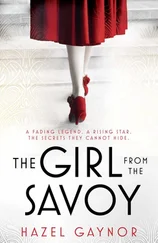In all my early memories my mom is doing one of two things: fixing her makeup or telling me to go out to play. Her appearance was her calling card, and she knew it. I’m not quite sure if she was fearless, or reckless, or both; I do know she was the kind of person who didn’t look back. After her first early marriage she joined a traveling rodeo, following a boyfriend who was a cowboy. It’s not like she was a great rider—but she looked gorgeous on horseback, and figured she’d learn a few tricks. It beat selling ladies’ shoes, which was her previous day job.
Mom didn’t really have a long attention span when it came to men. She first married a local boy at seventeen when she was four months pregnant with my sister, Kim; they also had another baby, who died suddenly at five months old. They divorced shortly thereafter. Six years later, she married her second husband, Robert Nye, and had me. She divorced him when I was three and married Jack Gailey, the man I always knew as Dad. Dad could be an arrogant, superior man—because he knew he was generally the smartest person in the room—but I adored him, and he doted on me. Which is why, when I got older, I never tried to find my biological father. It felt like an insult to the man who raised me—and I’m pretty sure, given Jack’s controlling nature, he didn’t want me trying to find him, either.
Soon after they met, Mom and Dad were cast opposite each other in a community theater production: he was Caesar and she was Cleopatra. My mother was a romantic. Perhaps she saw a better end for her and Dad than the characters in Shaw’s play.
It was obvious to me even as a child that my mother’s dreams went beyond being the Ourisman Chevrolet girl. She was going to make it out of York, Pennsylvania, one way or the other. It was just a question of when. And with whom… because my dad had no intention of leaving his hometown.
Mine was a very happy early childhood, but at the same time it also had more than its share of chaos. We knew to go home when the streetlights came on, but that was about the extent of our monitoring. Disagreements at school were settled with ass-kickings when the teachers weren’t around—girls, boys, it didn’t matter; there was no such thing as “processing” or “talking it out.” In my own home, my sister and I were pretty much left to our own devices, rattling around in our enormous mansion. Because my father had two law practices and my mom did dinner theater, we were largely cared for by Nana, my mother’s mother. This was a little problematic, because although we loved her dearly, Nana was mentally ill. Something had happened to her when my mother was fifteen—some combination of manic depression and schizophrenia, the doctors said—and when she took her medications, she was fine. When she didn’t, she ended up in the hospital. We were never filled in on the details, but I do remember her throwing away a bunch of my father’s belongings, and at one point she became convinced that the wiring in the house was making her teeth hurt, so she went into the basement and tore it out. Wiring had always been a problem for her; earlier in her life she felt her home wiring was sending her malevolent messages, so she called the FBI. We loved Nana, but she was not the most stable person you’d ever meet.
I was a smart and independent little kid, more aware than most of what was going on in the world, and desperate to learn. My sister took a picture of me holding up a sign when I was three that said I WANT TO GO TO SCHOOL, because I would cry that I couldn’t yet read.
I skipped kindergarten, and once I got to school I got good grades without working too hard, but still I wasn’t too happy. Being smart—particularly being a smart girl—didn’t go down well in a factory town. And while later I would become perhaps too much of a people-pleaser, in the early days I wasn’t good with rules and follow-through—and that’s what school is. I faked a lot of stomachaches— had a lot of stomachaches—and given my mother’s laissez-faire attitude, let’s just say I didn’t get an A for attendance. I never thought of myself as a child, and neither did anyone in my family. Treating me like one often backfired. I did want to please people—but even when young I had a fairly good bullshit detector. When I was four, for example, my preschool teacher alerted my mother that perhaps I had emotional problems because I liked drawing with black crayon. That’s all I needed to hear. My drawings became even more determinedly gothic.
I was a tomboy who geeked out with the guys: Spider-Man comics, Star Trek, leaping from garage roof to roof. I had no patience for girly-girls and their Easy-Bake Ovens. (Then again, I was never in doubt about my romantic interests: Donny Osmond was my man and I would stare at his poster in my bedroom, convinced his eyes were following me around the room.)
Many little girls fantasize about becoming actresses. In the early years I didn’t—but then again, I think my mother dreamed that dream for me. She didn’t try to get me out of my overalls and sneakers and into frilly things. Maybe that wasn’t necessary, as I resembled Tatum O’Neal, who was a huge (and tomboyish) child star at the time. Mom was constantly taking pictures of us girls. She tried to get my sister an agent when she was seventeen, and she got me my first modeling job—for those Astroturf daisy doormats—when I was ten.
But ten was a memorable year for reasons other than the occasional modeling job. One day, my girlfriend Ann and I were playing in the alley behind my house when a man pulled up, said he was a cop, and asked us to go for a ride. I was skeptical. Where was his uniform? Why did he need us to come with him? But my friend wasn’t able to question the authority of a grown-up. I told her to come with me. She wouldn’t. I was too short to reach the latch over the back gate to get safely back into my yard, so I told her to stay put, I’d go through the front yard and unlatch the door for us. Why didn’t I demand she come with me? Why didn’t she just come? I don’t know.
By the time I got back, she was gone. The man grabbed her, put her in the car, took her into the woods, and raped her. Then he left her, naked and shivering. She made it to someone’s house, and the residents wrapped her up and called the cops.
This all happened quite quickly, and she was found later that day. But right after it happened I was warned: you don’t talk about these things, you don’t mention it at school, you don’t let anyone know it was her or say what happened or just… anything. Of course, this was my friend, and one day I couldn’t help asking. He hurt her, she said, and she bled. And that was it. We never mentioned it again, and within a year she moved to New York and I never saw her again.
Why wasn’t I traumatized by this at the time? I think coming from the town I did, I just accepted that bad things happened and you got over it. I remember hearing about how Aunt Jane’s car was stripped. I remember my mother telling me she was mugged in New York City—a knife to her neck, the mugger screaming, “Shut up or I’ll cut your fucking face!” (They never caught the guy, and a few weeks later an airline stewardess had her throat slit in the same neighborhood.) One of my friends was conceived as a result of rape; another was raped in an alley by an acquaintance about six months after what happened to me.
So in later years, if you asked me what rape was—and I was asked, over and over—this was it: it was being abducted by a stranger. Being taken to the woods, to a dark alley. It was quick and brutal and anonymous. There was no room for seduction or gentleness, even gentle coercion, in my definition.
It was around this time, I think, that my parents began to fight a little more frequently. Nothing out of the ordinary. It’s just that my mother was doing more and more dinner theater around Pennsylvania and Maryland, and my dad did not like her being away that much. When I was ten or eleven my mother won the part of Adelaide in Guys and Dolls —and my father forbade her from taking it. He called the director and told him he wouldn’t let her do it because it would take too much of her time.
Читать дальше












